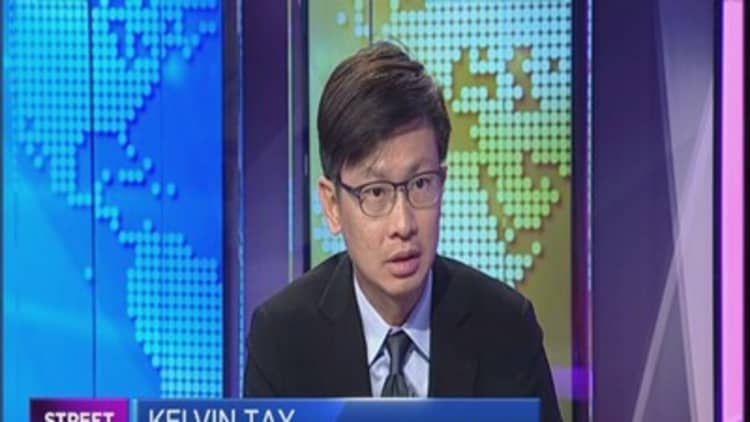While the world's attention is focused on China as it moves from heavy manufacturing to a more service-based economy, Hong Kong is undertaking its own important shift in focus.
Where once it specialized in manufacturing goods to ship to the world, Hong Kong is now reinventing itself as a financial technology hub where innovation thrives.
Hong Kong's reputation as one of the globe's most-free economies and the relative ease with which companies can set up shop is key to the metamorphosis, experts say.
"Hong Kong is like New York [City] on steroids" in terms of the speed of doing business and the entrepreneurial spirit of its citizens, Janos Barberis, the Founder of FintechHK, an organisation that brings together start-ups, community and events that shape Hong Kong's innovation ecosystem.
One area ripe for disruption is financial services, observers say. Hong Kong is an important financial center, with 70 of the world's 100 largest banks present. This, coupled with robust intellectual property laws, makes a fertile environment for the emergence of financial technology, or fintech, companies.
Fintech has long been relied on by banks - automated teller machines (ATMs) were, after all, invented in the 1960s - but since 2007 a new wave of players have been heating up the market. They moved away from creating banking industry technology and instead took the form of e-commerce start-ups or internet finance companies, Barberis said, citing Alibaba as an example.
Accelerator programs such as Hong Kong hosts are vital as they create a bridge between the mainstream financial services sector and fintech start-ups. The collaboration not only introduces a new and interesting work culture for bank employees but also gives established players the opportunity to incubate innovative banking products and services.
As a result, there is little surprise that large banks are multiplying the opportunity to interact, collaborate and even acquire fintech, Barberis says.
And the clamor for fintech is not restricted to banks. The University of Hong Kong has introduced up to a dozen additional courses on financial technologies, anticipating increased interest from students for employment opportunities in fintech start-ups, rather than the long-popular investment banking and corporate law options.
Read MoreUK pushes to be 'China's best partner' despite fears
"The human capital and intellectual capital is here and this is key as both traditional banks and fintech companies look to recruit the next wave of talent," Barberis, who is also a fellow of the Asian Institute of International Financial Law, says.

The frenetic activity in the fintech space has bled into the commercial property sector, with the creation of a new kind of office space. There are now more than 40 co-work spaces where start-ups from around the globe and across numerous sectors congregate. This is according to Invest HK, a department of the Hong Kong Special Administrative Region Government that aims to attract foreign direct investment and support overseas and mainland businesses to set up in Hong Kong.
TusPark is the latest such space, and already the largest with more than 50,000 square feet of space. There is an entire floor dedicated to fintech that provides offices for companies entering and expanding out of the mainland market.
An Invest HK survey in October 2014 found that the 37 co-worker spaces and incubators operating in Hong Kong at that time were hosting 1,065 startups. This was an estimated 30 percent on-year increase. Of the 1,065 startups, 53 percent were homegrown innovators.
In another sign of rapid growth, in 2014 Invest HK helped 62 entrepreneurs to start their businesses in Hong Kong, compared to 52 in the first six months alone of this year.
The government is doing more than just backing Invest HK in order to boost innovation. Hong Kong's growth initiatives include the development of an intellectual property (IP) trading hub that offering IP consultation, manpower training and other services to local small and medium-sized entrepreneurs.
In addition, the Hong Kong government is formulating proposals for China's National 13th Five-Year Plan - the country's blueprint for development from 2016-2020 - in order to seize the opportunities brought about by China's growth to enhance its competitive advantages, says Dr. Simon Galpin, director-general of investment promotion at Invest HK.
Read MoreThis startup lets you hire a luxury suitcase in Hong Kong
In its most recent policy address, the Hong Kong Government laid out its commitment to nurturing the start-up ecosystem. Key measures include the injection of HK$5 billion ($645 million) into the country's Innovation and Technology Fund, as well as setting up an enterprise-support scheme to enhance funding support for private sector research and development projects, said Agnes Chan, Managing Partner of Ernst & Young (EY) in Hong Kong and Macau.
Meanwhile, the Hong Kong Science and Technology Park (HKSTPC) will extend its Leading Enterprise Acceleration Program to help companies with potential to consolidate their businesses, raise capital and improve their corporate management. HKSTPC will also earmark HK$50 million to set up a corporate venture fund for co-investment opportunities.
Other initiatives are being carried out to support start-up and creative industries, including the film, fashion designers and branding sectors, as well as art groups, EY says.
Chan told CNBC: "Over the past years, the Hong Kong Government has been adopting a more proactive stance towards promoting the development of such sectors as the creative industries and innovation. This can sustain the value added from these sectors and hence help diversify the growth potential of the local economy."

